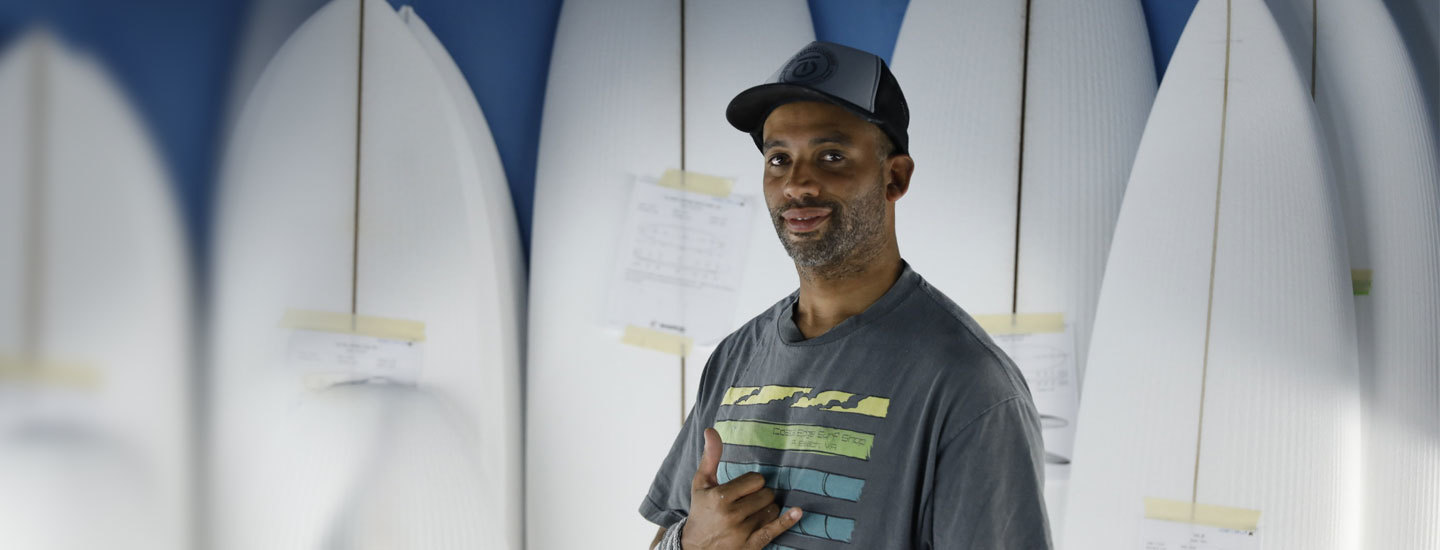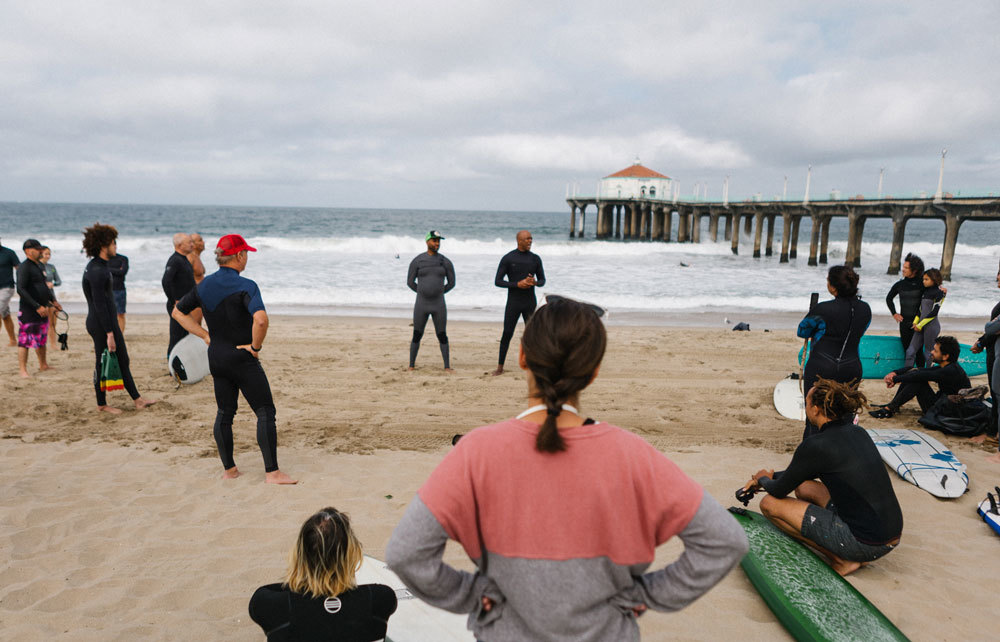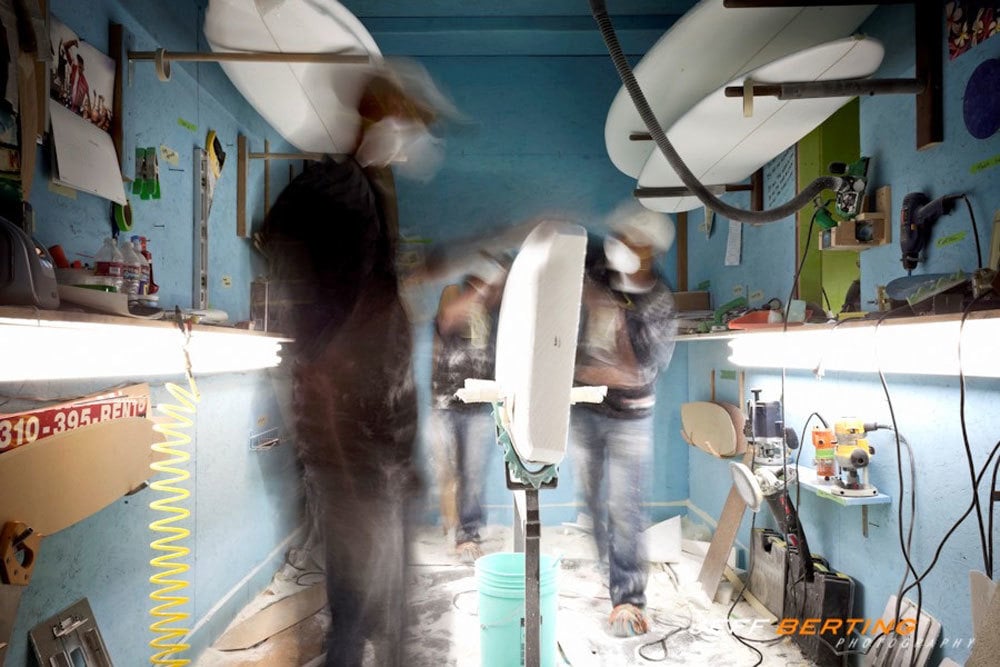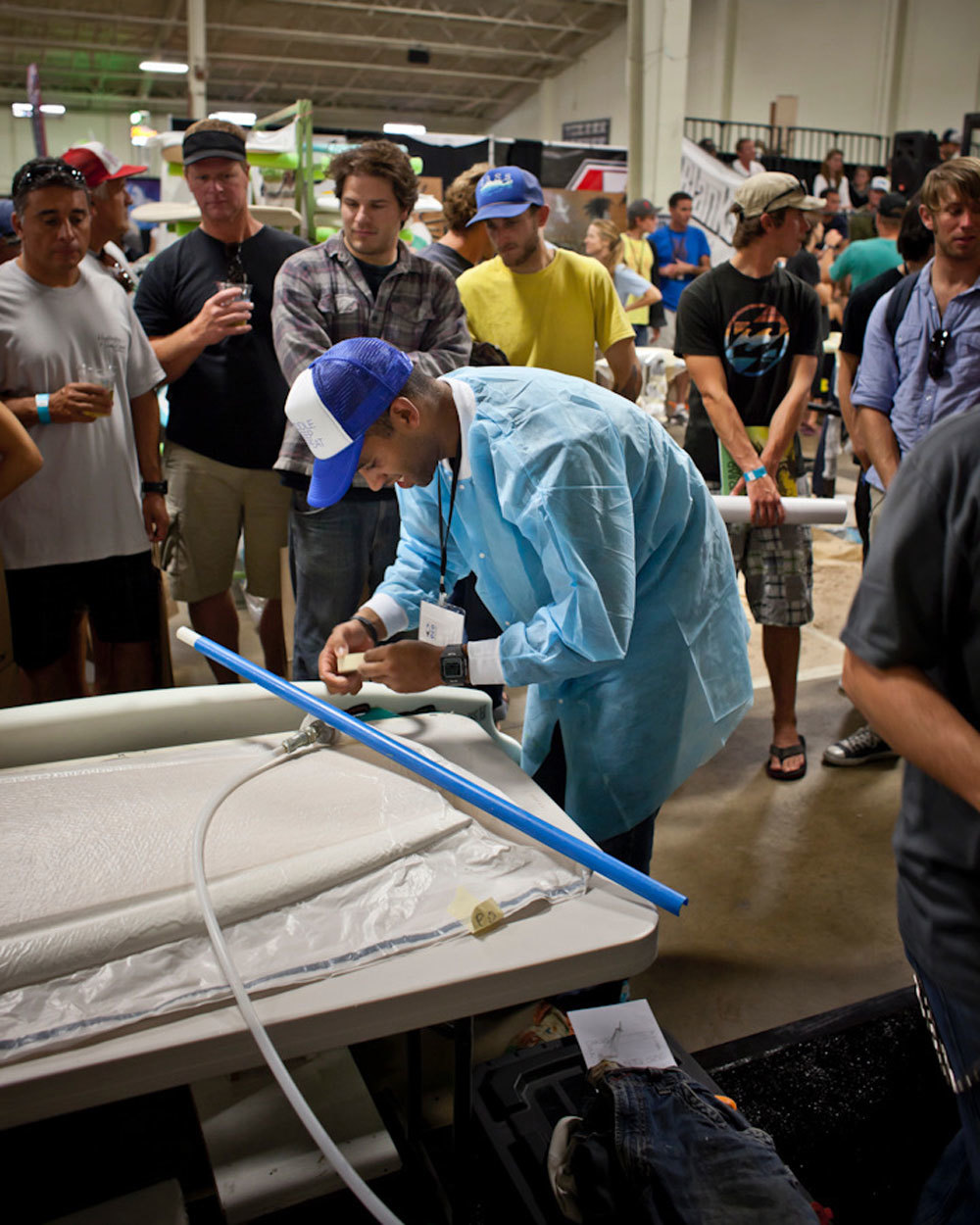
What is your current job or role?
I own Earth Technologies. My company is the leading production facility in the environmentally sustainable surfboard movement. So I like to call us the Ecoboard Capital. We make everything from plain old shortboards to fish. Basically, if it goes in the water we make it. Paddleboards, standup paddleboards, the skateboard that's coming out soon.
When did you start surfing?
I didn't get into surfing until I was in college, and my best friend and college roommate took me out to Oswald West in Oregon, they call it Shortys. I moved down here to LA about 20 years ago and immediately fell in love with surfing. I got hooked. I got the stoke meter through the roof as soon as I moved down here.

How did you get into shaping surfboards?
So I'm a pretty big guy. I got into shaping boards immediately when I moved down and fell in love with surfing because I was destroying my equipment. So I started doing my own repairs and about six months into that, a buddy was like, “well, dude, you're good at this. You're doing cool artwork over the repair, the airbrushing and you should buy a blank.” So I went to Foam E-Z, bought a polyurethane blank, got a planer, got the power tools and started shaping in the garage. The rest is history. It started as a hobby and eventually it turned into a full-on career. They say, “pursue what you love and you'll never work a day in your life.” It's work, but it's a labor of love.
Could you tell me a little bit about the construction of your boards and why you chose to use eco-friendly materials and methods?
I started shaping traditional polyurethane blanks first for about 7-8 years before the invention of the bio epoxy resin. And when I started shaping epoxy, no one was using epoxy blanks and my hands were kind of forced because of the Clark Foam closure and people couldn't get polyurethane blanks, but epoxy (expanded polystyrene) blanks were readily available. I just forced myself to learn how to shape epoxy blanks. About the time I started doing that, I met the owner and founders of Entropy, who invented the very first bio-epoxy resin. And it pretty much all happened really quickly. I became an expert epoxy builder because I had to glass my own boards because the resin was experimental. I did the switch initially because my board was stronger, my board didn't break. It was a performance attribute. And then I just went full on, full bore into the sustainability and kind of leading the charge of the ecoboard movement. They call me one of the founders of the ecoboard movement. That's great. And that's the key. The boards are sustainable, but they have to be just as good as what's out there. They feel just as good as regular boards. They last a little bit longer. They have better flex and it's not that bad for the people building them or for the environment.

How has your unique experience as someone from the Black American community framed your perspective as a surfer, shaper and ocean enthusiast?
To answer that you have to go back to my roots, because I grew up in Oregon, which, mind you, is 97% white. I moved down here to Los Angeles and I got a little bit of culture shock because LA’s a melting pot, which I loved. I love how diverse it is but the surfboard and surfing industry is not very diverse. And at first, kind of breaking in and learning to surf while shaping, people looked at me and said, “y’all don't surf.” I never got anything gnarly like racial slurs or anything like other people have, probably because I am a big guy, but I would get the, “What are you doing here? You guys don't surf. I mean, that's cool, but you guys don't surf.” And then, “you shape too? What?” They're heads spin. So that used to be the reaction and I think now that I've made my place in this industry and continue to do the sustainable thing and bring that to the masses, people know me and they respect it and it's not color, they don't see color, which is great. One of the things that I saw this summer that brought joy tears to my eyes was during Labor Day weekend. I saw more colored people, more black people, brown people, yellow people that I've ever seen at the beach with their family surfing. And it wasn't an event. It was just a three-day weekend. And it was really encouraging and really cool to see because I'd never seen it before.
So what are some local issues that are affecting your ocean waves and beaches up there?
Number one, hands down, is the urban runoff. Always. The pollution is absolutely ridiculous. Obviously we're in SoCal, it doesn't rain very often, but when it does, I will not touch that water. I won't go near it because I've gotten sick multiple times from surfing. And now you factor in a gnarly pandemic with masks and gloves and Coronavirus. The pollution is pretty gnarly. I think that's our biggest concern up here.

What’s been your experience being a surfer or ocean enthusiast as someone from the Black American Community?
I would say if you asked me that same question 15 years ago, you would have a completely different answer. I'm a pretty positive person. I've had the gnarliest experiences being a Black person driving outside of LA in Malibu, or going to work in LA when I used to bartend. But specifically in surfing, the experience has been a little bit negative, but relatively positive because I'm very loud, I'm a character and I talk story. And I do look different than a lot of other surfers. And I do talk about it. And there's all these different organizations, Black Surfing Coalition and Color the Water, which are doing amazing work and right now I am amped to be a surfer of color because we can lead by example. We can encourage more people to get out in the water that look like us. It's a sport for everybody.
What’s one of the most important things you would tell somebody about protecting the environment and the environment's connection to surfing.
Well, I've got a simple phrase, the golden rule applies to our planet too. Treat people the way you want to be treated. You wouldn't just toss trash on somebody else's lawn, why would you do it in the ocean? We want to leave this place better than we came into it, better for our kids, for our kids' kids and their kids. It's all connected. And honestly, if we didn't have waves in the ocean, we wouldn't have a sport. You read about climate change and rising sea levels and how that impacts surf breaks and we know all these things and now it's so important that we start taking action to protect this planet.
Where's your favorite surf spot and go-to surfboard right now? What are you riding on the regular?
Favorite surf spot would be Leo Carrillo. I used to sponsor a contest up there actually years ago. The Black Surfing Association put on a contest for five or six years. And I fell in love with that place. I’ve got a special connection to Malibu and I'm basically considered a local there, believe it or not. I would say El Porto in the South Bay because that's my home. And I've been surfing there long enough. I know when it's going to be on and going to be off.
My favorite go-to board right now is the Stoked Ninja or the HJM and the reason is I've been able to utilize my platform to actually help. The Stoked Ninja was developed with Selema Masekela and we designed it together to be a daily driver. It's a board you'd take on trips and it's a board you take when the waves are good. Not a step up, just a good wave board. It's good in a lot of different conditions and $100 from each sale is going to Stoked Mentoring, which Selema founded 15 years ago with Steve Larosiliere. And so we are taking that money from the sale and then Redbull matches the donation, so $200 from the sale of each board goes to Stoked Mentoring.
Anything else you want to add?
This summer Me, Selema, Hunter Jones and Danielle Black Lyons launched our organization “One Planet, One People.” It’s for surfers of color and it’s a collective activation supporting climate action, racial and social equality. Our goal is for people to use the hashtag #1PlanetPeople in hopes to create a community that supports climate action, racial and social equality.
A percentage of all ecoboard sales and accessories from Earth Tech Surf goes toward a nonprofit in need. We are encouraging other companies to do the same.
Check it out at https://www.1planetonepeople.com

